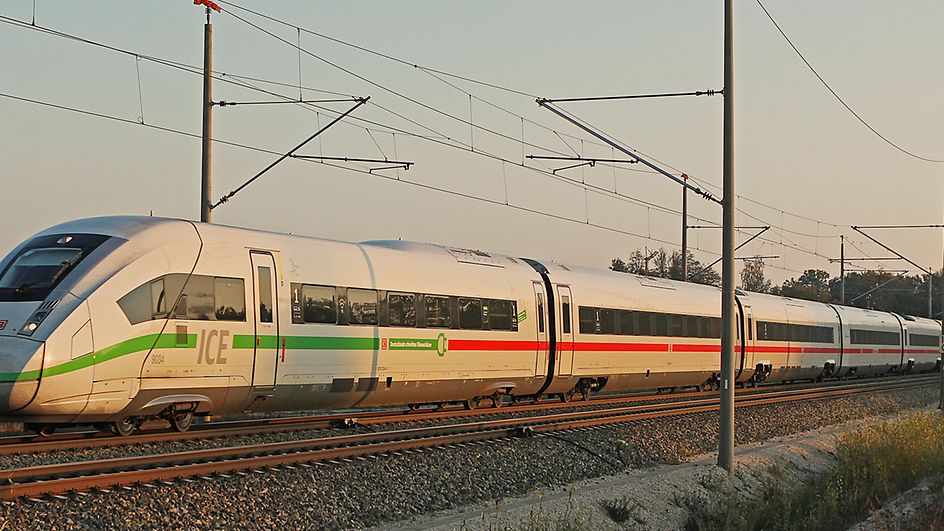Distributing revenues via blockchain
Article: The chain of trust
09/2019 – A trip will frequently involve many transport providers. With blockchain technology, revenue allocation becomes transparent for all contracting parties. This can also be advantageous for customers.
Anyone who has been to a restaurant with friends is familiar with the situation: when the bill arrives at the table, the discussion centres around who pays what share. The more people are present, the more complex the allocation becomes. Deutsche Bahn faces a similar situation: It transports around 7.3 million travellers daily on its long-distance trains, regional trains and buses. Many different regional rail or bus companies operate within a transit district. The PSO services in Germany, i.e. buses, suburban trains, metros, and trams, are already today being operated by more than 400 companies. Passengers can use the services of a variety of mobility providers in their own personal travel chain. The customer, therefore, purchases a networked trip from A to B using multiple transport companies – without having to pay attention to the fares or providers within the district.
Transparent allocation via blockchain
Yet the question is: how should the revenue on a ticket, for example a one-day ticket within a district, be distributed among the transport companies involved? Transit authorities are faced with the complex task of regularly allocating the ticket sales to the transport companies – and to unequivocally determine which revenue falls to which provider. “There is a ticket that the customer purchases. But it cannot be definitively determined how it was used,” says Jörg Strubberg, Director of Revenue Management at DB Regio. The situation is exacerbated by the involvement of an increasing number of providers, such as bike, car and ride sharing. “Up to now, random surveys were taken at regular intervals that were then validated by statistical methods. This is time-consuming, expensive and delivers a result that is subject to much discussion. This leads to differences in opinion on what share should fall to each transport company.” In summary, the existing distribution system is neither transparent nor flexible, and in turn leads to a delay in the allocation of revenue. On the basis of blockchain technology, DB Regio has, together with DB Systel, found a fair and transparent solution for revenue allocation.
Blockchain makes travelling easier – whether it’s a daily trip to work, a longer business trip or a short weekend trip. Passengers usually use various transport providers, such as rental bikes, buses, and regional and long-distance trains to reach their destination. © DB Systel GmbH
Blockchain originally grew popular in conjunction with bitcoin, the virtual currency. But the technology is capable of much more than securing payments on the Internet. In general, the blockchain method encrypts electronic transactions in a secure and trustworthy manner. Chain-linked blocks are stored in a distributed fashion on the net. Every user has access to the same information. Whether or not transactions exhibit the correct information is confirmed by the other blockchain participants. The system monitors itself. Since 2018, Deutsche Bahn has had its own Blockchain team that is investigating the deployment of this technology for the Group. Around 30 employees, including developers, software architects and project managers, unify technological know-how with mobility expertise. Currently around 20 use cases are being developed on the basis of blockchain technology. These include logistics supply chains, simpler cross-carrier ticketing and rail operations, and they involve research projects, prototypes and practical implementation. One of these use cases is an application that will make revenue allocation smoother and more effective for various mobility service providers, mobility companies and the end customer.
"Thanks to blockchain technology, a ticket is fully transparent from its purchase to the end of the trip, including any transfers en route."

The mobility services are located on a neutral platform for intermodal ticketing. The blockchain creates trust between all participants. As soon as a revenue is generated, all participants can check how they participate in this revenue. At the same time, the platform enables a capacity management between the various transport providers. “With the use of blockchain technology, a ticket becomes fully transparent from its purchase to the end of the trip, including any transfers en route.” On this basis, two different scenarios can be derived for how the project will evolve in the future. In the use case described here, all current distribution logics can be understandably displayed for all participants in a manner that is technologically clear and transparent.
Vision: Tracking in real-time
In a later expansion stage, blockchain could be used to track exactly where the ticket was purchased and how it was used. This would render the distribution logic even more accurate and make it available in real-time – and additional mobility service providers such as airlines or taxi companies would be interested in being part of this travel chain. The passenger obtains a seamless trip, regardless of what happens en route. For example, if a flight is cancelled, the traveller is automatically rebooked on another one. It is not necessary for customers to deal with substitute and connecting flights themselves, and they do not need to negotiate the complexity of the network between various carriers. The mobility partner, in turn, is allocated the correct share of the trip. “Thus blockchain is not limited to representing today’s world. With additional information, new participants and new routes, it will be possible to reliably and understandably calibrate the revenue allocation in the future,” says Jörg Strubberg.
"A classic database requires an administrator or an institution who takes care of data administration – and who must be trusted. A blockchain permits all participants to view the data, which cannot be manipulated."

The advantages of blockchain technology are many. During development, the focus was on the trip or the mobility of the person and not on a means of transport. “The number of modern mobility service providers is increasing and we still have a long way to go before these can be integrated in a combined ticket. For this reason, we plan on creating a standard that guarantees that all participants will receive the correct share,” says Moritz von Bonin, Blockchain Director at DB Systel. “The blockchain network strengthens mobility service partnerships while also enabling customers to have an uninterrupted travel experience.”

Same view for all transport companies
A classic database requires an administrator or an institution who takes care of data administration – and who must be trusted. A blockchain permits all participants to view the data, which cannot be manipulated.” The revenue allocation takes place immediately and not only at the end of the month. This improves cash flow for the involved transport companies, partnership models move into the foreground, and a central power concentration and intermediaries are avoided.
The pilot project was already completed one year ago. A comprehensive market test with a variety of providers is due to start in the near future. All providers are already in agreement that the blockchain approach creates new opportunities and that additional transparency creates advantages both for small and larger transport companies. If the plan to establish a blockchain standard on the market that guarantees every participant a fair share based on actual usage proves successful, this will also be a great advantage for customers.
Would you like to utilize the many possibilities and advantages of blockchain technology for yourself? Then find us here and please contact us without obligation at blockchain@deutschebahn.com.


